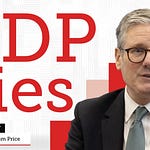Join IEA Managing Editor Daniel Freeman as he explores how trade tariffs shaped America with Professor Alexander Klein. In 1870, the US had a massive 45% average tariff on imported goods - compared to just 2% today. Professor Klein breaks down why the US adopted such high tariffs after the Civil War, and what this history tells us about current debates around trade protection. From intense lobbying battles between Northern and Southern states to surprising findings about productivity, this conversation challenges common assumptions about America's economic development.
In this wide-ranging discussion, Freeman and Klein examine how even successful American companies pushed for trade protection, using the argument "other industries get tariffs, why shouldn't we?" Klein explains why high tariffs actually reduced productivity across most industries, despite creating more jobs - a tradeoff that's still relevant in today's policy debates. They explore how America's huge domestic market, natural resources, and waves of immigration were more important to its industrial success than trade barriers.
As politicians today call for higher tariffs to protect American jobs, this historical perspective offers important lessons. Klein's research shows how trade protection can become politically addictive, even when it doesn't help economic growth. He also highlights the dangers of rising trade barriers during economic crises, drawing parallels between the Great Depression and current debates about globalization and industrial policy.













